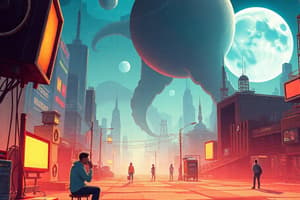Podcast
Questions and Answers
Users no longer passively receive information pushed onto them by broadcasters.
Users no longer passively receive information pushed onto them by broadcasters.
True (A)
Social media platforms have not altered how we communicate, share information, and consume media.
Social media platforms have not altered how we communicate, share information, and consume media.
False (B)
Media consumers do not engage with news through comments sections and sharing features.
Media consumers do not engage with news through comments sections and sharing features.
False (B)
The desire for personalization has not influenced media consumption habits.
The desire for personalization has not influenced media consumption habits.
Traditional gatekeepers like TV networks and newspapers are still the primary sources of media production.
Traditional gatekeepers like TV networks and newspapers are still the primary sources of media production.
Technological advancements have not played a role in shaping contemporary communication.
Technological advancements have not played a role in shaping contemporary communication.
The printing press revolutionized communication by enabling mass production of books and other written materials.
The printing press revolutionized communication by enabling mass production of books and other written materials.
Computers have not contributed to any innovations in media production and distribution.
Computers have not contributed to any innovations in media production and distribution.
Telecommunications technologies like telegraphy did not have any impact on transforming communication processes.
Telecommunications technologies like telegraphy did not have any impact on transforming communication processes.
The World Wide Web was established in the early 2000s.
The World Wide Web was established in the early 2000s.
Social media platforms like Facebook and Twitter have not influenced changing consumer behavior towards media consumption.
Social media platforms like Facebook and Twitter have not influenced changing consumer behavior towards media consumption.
Traditional media outlets like newspapers and radio are still the most dominant forms of media in today's digital age.
Traditional media outlets like newspapers and radio are still the most dominant forms of media in today's digital age.
Flashcards are hidden until you start studying
Study Notes
Evolution of Traditional to New Media
The landscape of communication has undergone significant changes over time, with traditional media like newspapers, magazines, radio, and television being gradually replaced by newer forms of media such as the internet, social media platforms, and mobile devices. This shift can be attributed to several factors including technological advancements, changing consumer behavior, and the rise of user-generated content.
Technological Advancements
Technology has played a crucial role in shaping the evolution of media. The invention of the printing press revolutionized communication by making it possible to mass produce books and other written materials. In more recent times, computers have led to further innovations in media production and distribution, allowing users to create and share digital content quickly and easily.
Telecommunications technologies also contributed significantly to this transformation. The development of telegraphy allowed messages to be sent instantaneously across vast distances, while telephone technology made voice communication possible over long distances. These advances laid the foundation for modern media services like broadcasting and cable TV.
Moreover, the emergence of the World Wide Web in the late 1980s democratized access to information and paved the way for the rise of online news, blogs, podcasts, and streaming services. Today, smartphones and tablets serve as versatile tools for consuming media, facilitating constant access to various forms of content from anywhere.
Changing Consumption Habits
As technology advanced, so did our consumption habits. People now expect real-time updates and want greater control over their media consumption experiences. They don't just watch news; they engage with it through comments sections and sharing features. Additionally, media consumers no longer passively receive information pushed onto them by broadcasters; they actively seek out specific pieces of information using search engines and social media.
This change is partly due to the increased desire for personalization. Users prefer tailored recommendations rather than generic offerings. Services like Netflix suggest movies based on your viewing history, while YouTube recommends videos based on your past interactions with its platform. Furthermore, the proliferation of social media has enabled users to curate their own feeds, only seeing posts from individuals and brands they follow.
Role of Social Media
Social media platforms have fundamentally altered how we communicate, share information, and consume media. Platforms like Facebook, Twitter, Instagram, Snapchat, and TikTok allow users to interact with each other directly, share content instantly, and create communities around shared interests. As a result, many people now turn to these platforms first when seeking news and current events, often before visiting dedicated news websites.
One notable aspect of social media is the ability for anyone to become a broadcaster. With tools like YouTube, Twitch, and Periscope, regular people can live stream their activities to large audiences, creating a direct connection between creators and viewers. This democratizes media production, giving individuals a platform to express themselves without relying on traditional gatekeepers like TV networks or newspapers.
In conclusion, the evolution of traditional media into new media has been driven by technological advancements and changing consumer behaviors. The adoption of social media has introduced innovative ways for people to create, distribute, and consume content. This transition continues to shape contemporary communication, and it will be interesting to see what future innovations bring to the world of media.
Studying That Suits You
Use AI to generate personalized quizzes and flashcards to suit your learning preferences.




